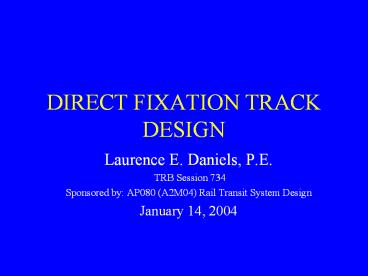DIRECT FIXATION TRACK DESIGN
1 / 29
Title: DIRECT FIXATION TRACK DESIGN
1
DIRECT FIXATION TRACK DESIGN
- Laurence E. Daniels, P.E.
- TRB Session 734
- Sponsored by AP080 (A2M04) Rail Transit System
Design - January 14, 2004
2
Alternative Title Choosing Fastener
StiffnessPresentation Order
- Direct Fixation definitions
- Fastener Stiffness Design Goals
- Fastener Stiffness and Rail Deflections
- Fastener Vibration Attenuation
- Vibration Sources
- Fastener Stiffness Fastener Natural Frequency
- Precision of Fastener Stiffness
- Summary Choosing a Fastener Stiffness
3
Credit
- The data on Direct Fixation fastener stiffness
in this presentation is a small portion of that
research reported under TCRP Project D-5, Direct
Fixation Fastener Performance. - Jim Tuten is gratefully acknowledged as the
Project Manager of that work.
4
Direct Fixation Definition
- Applicable Configuration for this presentation
- Ballastless track using discrete rail fasteners.
- Configurations not addressed
- Fully embedded rail
- Continuously supported rail
- Open deck bridges
- Ballasted track
5
Tangent Stiffness
6
Design Goals for Direct Fixation Fastener
Stiffness
- Protect the support from high impact loads
- Restrain the rail within acceptable deflection
limits - Attenuate vibrations (a very distant third in
importance to the railways performance)
7
Fastener Stiffness and Rail Deflections
- Lateral fastener stiffness is influenced by the
vertical stiffness. - Vertically softer fasteners will generally allow
larger lateral rail deflections than a stiffer
fastener. - Lateral Stiffness (and gauge deflection) is
influenced by vertical load. - Precession wave mechanics away from wheel load
are critical (very high L/V ratios near rail
uplift)
8
Fastener Lateral Stiffness vs. Vertical Load
9
Rail Clip Selection and Fastener Stiffness
- Rail clips and fastener specifications for rail
deflection must be compatible. - Example If the specifications for rail
deflection are held uniformly, the fastener for a
low longitudinal restraint system should be
different from a high longitudinal restraint
system. - (Better solution Adjust the deflection
specification for each system).
10
Point Fastener Stiffness Selection
- Choose allowable rail deflections first.
- Then, work backward to fastener stiffness from
those maximum gauge deflections and the expected
load range. - Notes
- Knowing lateral stiffness relation to a vertical
stiffness for a fastener is problematic and not a
current specification requirement. - Rail restraint capacity (rail clip) must be
compatible with resulting decisions.
11
Fastener Vibration Attenuation
12
Important Vibration Sources
- Axle and Truck Precession Waves
- Vehicle Kinematic Frequencies
- Pitch Mode
- Bounce Mode
- Yaw Mode
- Track Natural Frequencies
- Wheel/Rail Interaction (Curving, Hunting, Rail
Corrugation behavior) - Rail Natural Frequency
13
Vibration Source Frequency and Energy Levels
14
Fastener Vibration Filtering Concept
- Direct Fixation Fasteners are Low Pass
vibration filters - A Low Pass filter allows vibration frequencies
that are below the fasteners natural frequency
to be transmitted unimpeded. - Vibration frequencies above the fasteners
natural frequency are filtered. - A fasteners natural frequency is derived from
the fasteners stiffness.
15
Fastener Transfer Function
16
Transfer Function Illustration
17
Stiff Fastener Transfer Function
18
Soft Fastener Transfer Function
19
What is the Precision of Fastener Stiffness
Values?
- This question
- Effects underlying considerations of
specification stipulations. - Allows insight into the realities of fastener
manufacturing variations. - Centers our expectations on fastener properties
and performance.
20
Fastener Stiffness Variation
21
Fastener Tangential Stiffness
22
Stiffness Variation Other Manufacturers
23
Fastener Natural Frequency
24
Fastener Stiffness Tolerance Insights
- The fastener manufacturing can introduce
significant variations in fastener stiffness (not
currently controlled in DF QC specifications). - Of the 4 manufacturers with multiple tests on one
fastener model, one exhibited poor repeatability
of fastener stiffness and natural frequency
properties (not currently controlled by
specifications). - Rail modes (Light Rail, Heavy Rail, Freight) are
effected differently by fastener variations
(inconsistencies).
25
Insights on Fastener Stiffness Mechanics
- Fastener stiffness varies with applied load
- Fastener stiffness varies as the wheel load
approaches the fastener . - Rail modes invoke diffesrent fastener stiffness
ranges.
26
Fastener Natural Frequency and Source Vibrations
27
Fastener Effects on Vibration Attenuation
- DF fasteners can not attenuate primary rail
sources of ground vibration, the truck (or wheel)
passing frequencies and kinematic vehicle
motions. - DF fasteners can attenuate most or all wheel/rail
interactions (curving, hunting and rail
corrugation behavior), but these generally have
low energy levels relative to the primary rail
sources of ground vibration.
28
Summary Choosing Fastener Stiffness
- Fastener stiffness is determined primarily from
allowable rail deflections and expected loads
(safety criteria). - No current Direct Fixation Fastener model has a
natural frequency capable of attenuating the
primary sources of track vibrations. - Fastener stiffness is imprecise
- Stiffness varies with wheel approach to fastener
- Manufacturing is imprecise for some manufacturers.
29
Direct Fixation Fastener and Track Design
Information Source
- www.TrackEngineer.com































